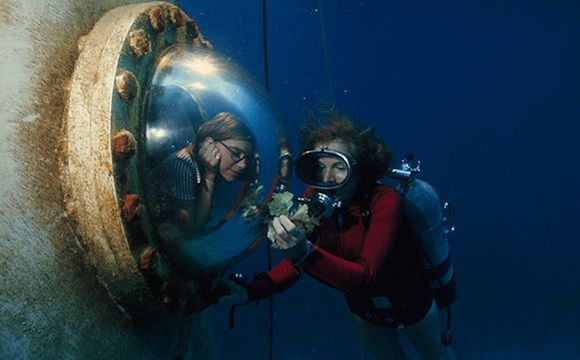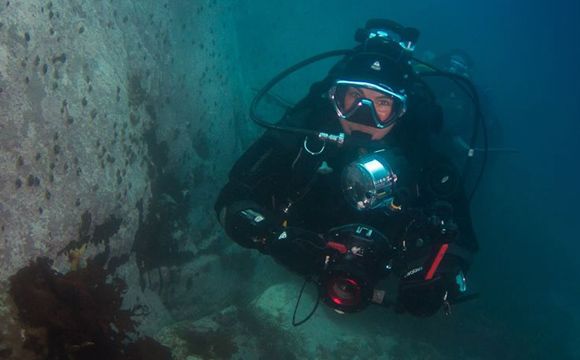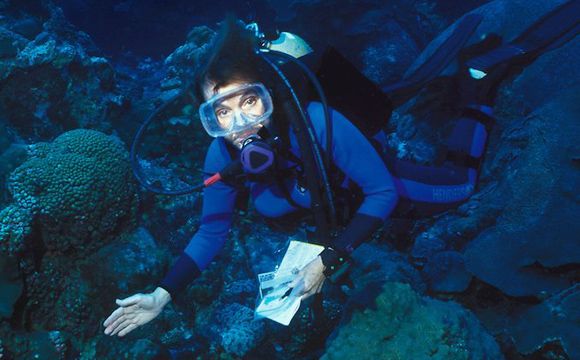
SCUBAPRO Deep Elite Team - Sylvia Earle
Sylvia Earle
Affectionately called "Her Deepness," or "The Sturgeon General," Sylvia Earle is a true inspiration to us all. She is a seasoned aquanaut who holds the depth record for a solo dive: 1,250 feet. Earle co-founded the company, Deep Ocean Engineering, and is a recipient of numerous awards and honorary degrees, including being named Time Magazine's first "Hero for the Planet". She also serves as a scholar and "Explorer-in-Residence" for the National Geographic Society. Most importantly, Sylvia is a tireless advocate for marine conservation and for fostering public awareness of the perils to ocean ecosystems caused by overfishing and pollution. Always motivated by an intense curiosity for the sea, she began diving at age 16 and has spent more than 6,000 hours underwater. We are proud to call this incredible ambassador for the oceans one of our own.

An Interview with Sylvia Earle:
Tell us about yourself:
"I'm Sylvia Earle. I'm an Oceanographer, Explorer in Residence at National Geographic, the founder of Mission Blue and the founder of a little company that builds submarines for deep ocean exploration and research."
Why did you decide to take the giant stride into the oceans?
"I got started a little late compared to some… I was a teenager. My first experience breathing compressed air underwater was not with regulator and tanks. It was with a copper diving helmet as our next-door neighbor in Florida was a sponge diver. I had my first experience of being submerged and weightless, thinking that I was going to look at the fish, and the fish came over and looked at me! I was hooked. It wasn't long after my professor was somehow was able to secure two of the first diving scuba tanks and regulators that came into the country - a big double hose and great, fat mouth piece. My diving course consisted of two words, "breath naturally" and then over the side we went. I loved it; they had to drag me out of the water because I wanted to stay. And it's always been that way ever since; with me staying underwater until the very last possible moment until I have to come up."

How has diving changed your life?
"When I began diving I was already set on a course to become a scientist. I knew when I was five years old that's what I wanted to do. I didn't know what to call it, but it had to be something with plants and animals, something that would enable me to be really with them in their natural surroundings, to observe without harming them. I realized with diving, I could do just that. I've been doing it for over sixty years and it has been an incredible tool for my research and also an incredible adventure. People ask me all the time: "Do you still dive?" And I say, "I still breathe so off course I still dive."
Tell me what, if you had to pick one of the most amazing experiences underwater, what would it be?
"In 1977, I was on an expedition in Hawaii to study the sounds and behavior of the Humpback Whales. We were among the very first to actually get in the water with the whales. Just imagine, there were no guidebooks about how you should behave when you in the presence of a whale underwater. But there we were in a little Zodiac boat, cruising along when five whales suddenly decided that we were interesting. They changed course and came straight to us. We stopped the engine, looked over the side and saw five enormous whales upside down looking at this curious thing in their blue backyard. It took a bit to decide we really wanted to get into the water with these huge beasts. But we did. And for two and a half hours, as long as the first astronauts who walked on the moon, we had the most ethereal encounter with the whales swimming around us the whole time. At one point, a gentle female we named Daisy came right up to me, looked me straight in the eye and then glided by gracefully. She could have destroyed me, but instead she was as curious about me as I was about her."

What is a special place underwater for you?
"Diving of the coast of Chile at The Juan Fernandez Islands comes to mind. We were amongst the first, maybe the very first people there on an expedition in 1965. On the first dive, I saw a little pink plant and I knew it was something no one has ever described before. Turns out, it was not just a new species, but it was a new genus, a new family, a new order of red algae. And I had the privilege of naming it! "
What is your advice to someone considering diving?
"My advice to those who are considering diving is: go for it today… Don't wait!! My mother waited until she was 81 in Bonaire. Afterwards she scolded me and asked why I hadn't gotten her in the water sooner. So I heartily recommend just doing it regardless of your age - and diving is ageless. Go to a place that is right for you and gently enter the water. You may have that sense of apprehension and think you can't do it - that it's impossible - but once you discover how easy it is ithere won't be any ever holding you back from getting in again and again."
Why SCUBAPRO?
"SCUBAPRO and I go way back. Our relationship started when, as a young working scientist, I needed diving equipment that I could trust. Since SCUBAPRO gear always had the top ratings, it was only natural I made the choice I did, but I certainly didn't expect SCUBAPRO to put me on the board of directors in the seventies. We had such a good time, the members of that board, that we actually often met in the Bahamas for underwater board meetings. Indeed, I even have a picture to prove it! Of course, we did not get much done, but we did it, and I will never forget the special times and people that were part of the experience. I have great affection for, admiration of and joy from my longstanding relationship with SCUBAPRO over the years."
What does diving mean to you?
Every diver should be an ambassador for the ocean, every diver should tell people that fish have personality, every diver should be out front doing what he can or she can to take care of the ocean. To be a voice for the ocean. Because divers see what others don't. It's one of the best hopes we have for the oceans. As ambassadors, we can tell the world why it matters not just that it's happening. The voices of divers are special because we have the power of knowing we are trusted voices - we've been there, we're witnesses, we see. If we use that power, we can really make a difference for the oceans. Only our planet has an ocean filled with life that makes our lives possible. It's time for us to return the favor and take care of the ocean that takes care of us.




